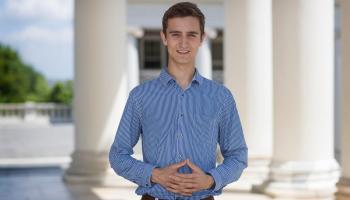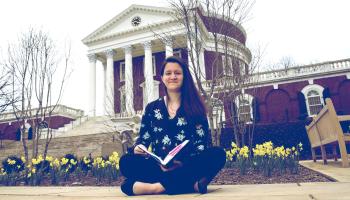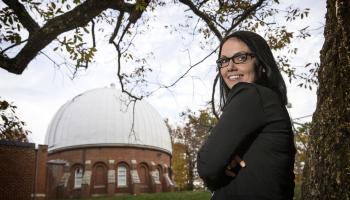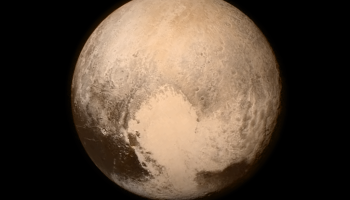UVA Astronomy Student Joins Ranks of Astronaut Scholars
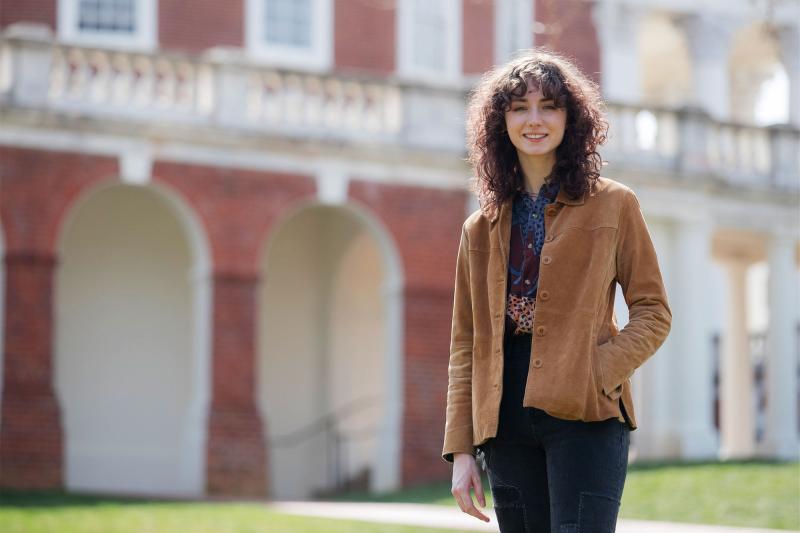
Theo O’Neill will continue exploring space as an Astronaut Scholar.
“I think astronomy is fascinating because of the sheer scope of topics involved,” said O’Neill, a rising fourth-year astronomy-physics and statistics major at the University of Virginia. “The enormous range of physical and energetic scales encompassed in this one field, from the behavior of individual grains of dust to the dynamics of interacting galaxies, is incredibly awe-inspiring.”
The Astronaut Scholarship Foundation was created in 1984 by astronauts from the Mercury 7 program to encourage university students pursuing science. The scholarships are valued at around $15,000 each and they provide an opportunity to develop relationships with astronauts and scholars.
O’Neill studies star formation and applies statistics to astronomy, focusing on the relationship between young stars and the clouds of molecular gas that they form within.
“My research currently involves studying the progression of star formation in nearby dwarf galaxies, which are interesting because their chemical compositions are similar to the conditions of the early universe,” O’Neill said. “By studying molecular cloud structure in these areas, we can improve our understanding of how stars form in extreme environments.”
Jonathan Tan, research professor in the astronomy department, recruited O’Neill as a first-year student to work on the Virginia Initiative on Cosmic Origins, a summer research position at Chalmers University, Gothenburg, Sweden, where Tan has a joint appointment.
“It was already notable that Theo had extensive research experience, even though still only a first-year student,” Tan said. “As a result of the COVID-19 pandemic, travel to Sweden was not possible, so the project was conducted remotely, with Theo working from home in California.”
In the research, O’Neill collaborated with Tan and a postdoctoral researcher on deriving the “Core Mass Function” – the distribution of masses of dense, self-gravitating molecular cloud structures that are the precursors of stars – which helps researchers understand the origin of stellar masses.
“Theo obtained latest observational data on about 30 regions of dense molecular clouds in our galaxy from the Atacama Large Millimeter Array telescope data archive,” Tan said. “Theo developed analysis methods to identify core structures using automated algorithms. The telescope data are typically quite complex to work with, but Theo needed very little guidance on handling of this part of the project, which is very unusual, even for graduate students.”
Tan said O’Neill found strong evidence for a break in the core mass function, which is the first time such a detection has ever been found in massive star-forming regions in this galaxy.
“At the end of the summer, Theo gave an excellent talk about the project and also presented the work at the January 2021 American Astronomical Society conference, again giving an excellent talk and ably fielding questions from the audience of researchers,” Tan said.
O’Neill sees networking as a scholarship benefit.
“I’m most looking forward to connecting with other scholars and presenting my research at an annual conference hosted by the Astronaut Scholarship Foundation this fall,” O’Neill said. “The mentorship and professional development opportunities associated with the award are also really remarkable, and I’m excited to benefit from the perspective of other members of the community.”
The Astronaut Scholarship is apt for O’Neill, who has a family connection with the space program.
“In the 1960s, my grandfather worked in Daytona Beach as a programmer for General Electric’s Apollo Support Systems team to supply the Apollo space program with computers and other technology,” O’Neill said. “I grew up hearing stories about watching Apollo launches from Cape Kennedy, and playing tic-tac-toe with computers the size of entire rooms. Receiving this scholarship is really meaningful to me because of its connection to the earliest American astronauts, including the Apollo program.”
O’Neill said working in statistics is instrumental in astronomy, since experiments can’t be performed under controlled conditions. That limits what can be inferred from observations, making statistics an integral part of harnessing the data.
“New telescopes and large surveys are generating larger volumes of data on a nightly basis than ever before,” O’Neill said. “The field is adapting to take full advantage of the opportunities this presents through an increased focus on data science.”
O’Neill has been a member of the Astronomy Department’s Diversity, Equity and Inclusion committee and the Graduate-Undergraduate Astronomy Committee, as well as a member of the Astronomy Club and the Outdoors Club. An Echols Scholar, a Goldwater Scholar and a College Science Scholar, O’Neill plans to attend graduate school for a doctorate in astronomy and to pursue a career in research.
“I would feel enormously lucky to be able to pursue astronomy research full-time as a career,” O’Neill said.





